This article needs additional citations for verification .(July 2014) |
Mammy Lou (born c. 1804 - died after 1918) claimed an age which would have made her one of the earliest-born people to appear in a motion picture.
This article needs additional citations for verification .(July 2014) |
Mammy Lou (born c. 1804 - died after 1918) claimed an age which would have made her one of the earliest-born people to appear in a motion picture.
In 1918, she appeared in the silent film The Glorious Adventure , directed by Hobart Henley, playing the part of The Mansion's Servant, the mansion being the Hermitage Plantation in Savannah, Georgia. Mammy Lou claimed she was 114 years of age, and had been a slave in Savannah until Abraham Lincoln abolished slavery; if proven, this would mean that Mammy Lou was around 60 years of age at the time she received her freedom from slavery.
If this legend is true, then Mammy Lou was one of the earliest-born individuals to appear in a feature film up until that time. The claim is unauthenticated, though, and a better claim may be made for Rebecca Clark(e), who appeared in a Kinora reel made no later than 1912 (Reel 145, "Rebecca Clarke and kitten"), and who has been proved to have been born in Dunstable, Bedfordshire, on 5 June 1810. [1]

Gone with the Wind is a novel by American writer Margaret Mitchell, first published in 1936. The story is set in Clayton County and Atlanta, both in Georgia, during the American Civil War and Reconstruction Era. It depicts the struggles of young Scarlett O'Hara, the spoiled daughter of a well-to-do plantation owner, who must use every means at her disposal to claw her way out of poverty following Sherman's destructive "March to the Sea." This historical novel features a coming-of-age story, with the title taken from the poem "Non Sum Qualis eram Bonae Sub Regno Cynarae", written by Ernest Dowson.
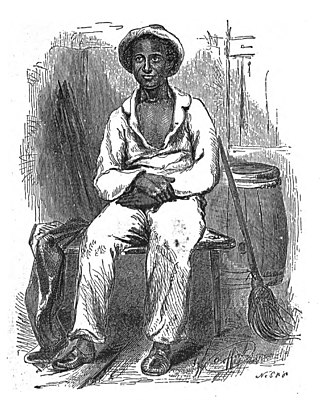
Solomon Northup was an American abolitionist and the primary author of the memoir Twelve Years a Slave. A free-born African American from New York, he was the son of a freed slave and a free woman of color. Northup was a professional violinist, farmer, and landowner in Washington County, New York. In 1841, he was offered a traveling musician's job and went to Washington, D.C. ; there, he was drugged and kidnapped into slavery. He was shipped to New Orleans, purchased by a planter, and held as a slave for 12 years in the Red River region of Louisiana, mostly in Avoyelles Parish. He remained enslaved until he met Samuel Bass, a Canadian working on his plantation who helped get word to New York, where state law provided aid to free New York citizens who had been kidnapped and sold into slavery. His family and friends enlisted the aid of the Governor of New York, Washington Hunt, and Northup regained his freedom on January 3, 1853.

Uncle Tom's Cabin; or, Life Among the Lowly is an anti-slavery novel by American author Harriet Beecher Stowe. Published in two volumes in 1852, the novel had a profound effect on attitudes toward African Americans and slavery in the U.S., and is said to have "helped lay the groundwork for the [American] Civil War".

Harriet Jacobs was an African-American abolitionist and writer whose autobiography, Incidents in the Life of a Slave Girl, published in 1861 under the pseudonym Linda Brent, is now considered an "American classic".

Alex Haley's Queen is a 1993 American television miniseries that aired in three installments on February 14, 16, and 18 on CBS. The miniseries is an adaptation of the 1993 novel Queen: The Story of an American Family, by Alex Haley and David Stevens. The novel is based on the life of Queen Jackson Haley, Haley's paternal grandmother. Alex Haley died in February 1992 before completing the novel. It was later finished by David Stevens and published in 1993. Stevens also wrote the screenplay for the miniseries.

Aunt Jemima was an American breakfast brand for pancake mix, table syrup, and other breakfast food products. The original version of the pancake mix was developed in 1888–1889 by the Pearl Milling Company and was advertised as the first "ready-mix" cooking product.
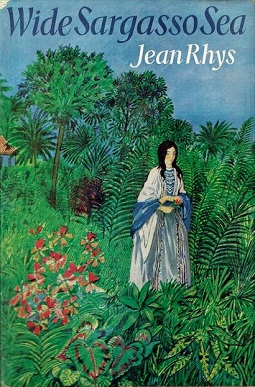
Wide Sargasso Sea is a 1966 novel by Dominican-British author Jean Rhys. The novel serves as a postcolonial and feminist prequel to Charlotte Brontë's novel Jane Eyre (1847), describing the background to Mr. Rochester's marriage from the point of view of his wife Antoinette Cosway, a Creole heiress. Antoinette Cosway is Rhys's version of Brontë's "madwoman in the attic". Antoinette's story is told from the time of her youth in Jamaica, to her unhappy marriage to an English gentleman, Mr. Rochester, who renames her Bertha, declares her mad, takes her to England, and isolates her from the rest of the world in his mansion. Wide Sargasso Sea explores the power of relationships between men and women and discusses the themes of race, Caribbean history, and assimilation as Antoinette is caught in a white, patriarchal society in which she fully belongs neither to Europe nor to Jamaica.

A mammy is a U.S. historical stereotype depicting Black women, usually enslaved, who did domestic work, among nursing children. The fictionalized mammy character is often visualized as a dark-skinned woman with a motherly personality. The origin of the mammy figure stereotype is rooted in the history of slavery in the United States, as enslaved women were often tasked with domestic and childcare work in American slave-holding households. The mammy caricature was used to create a narrative of Black women being content within the institution of slavery among domestic servitude. The mammy stereotype associates Black women with domestic roles, and it has been argued that it, alongside segregation and discrimination, limited job opportunities for Black women during the Jim Crow era.
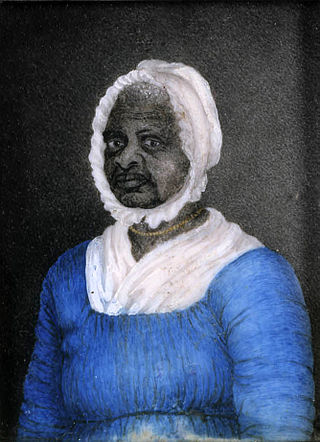
Elizabeth Freeman, also known as Mumbet, was one of the first enslaved African Americans to file and win a freedom suit in Massachusetts. The Massachusetts Supreme Judicial Court ruling, in Freeman's favor, found slavery to be inconsistent with the 1780 Constitution of Massachusetts. Her suit, Brom and Bett v. Ashley (1781), was cited in the Massachusetts Supreme Judicial Court appellate review of Quock Walker's freedom suit. When the court upheld Walker's freedom under the state's constitution, the ruling was considered to have implicitly ended slavery in Massachusetts.
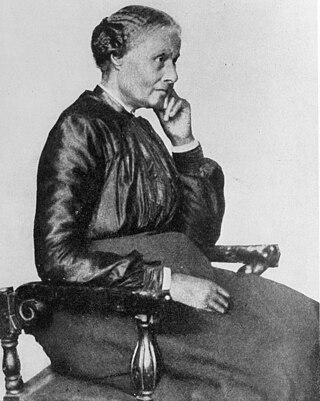
Mary Ellen Pleasant was an American entrepreneur, financier, real estate magnate and abolitionist. She was arguably the first self-made millionaire of African-American heritage, preceding Madam C. J. Walker by decades.

The internal slave trade in the United States, also known as the domestic slave trade, the Second Middle Passage and the interregional slave trade, was the mercantile trade of enslaved people within the United States. It was most significant after 1808, when the importation of slaves from Africa was prohibited by federal law. Historians estimate that upwards of one million slaves were forcibly relocated from the Upper South, places like Maryland, Virginia, Kentucky, North Carolina, Tennessee, and Missouri, to the territories and states of the Deep South, especially Georgia, Alabama, Louisiana, Mississippi, Arkansas, and Texas.

Partus sequitur ventrem was a legal doctrine passed in colonial Virginia in 1662 and other English crown colonies in the Americas which defined the legal status of children born there; the doctrine mandated that children of enslaved mothers would inherit the legal status of their mothers. As such, children of enslaved women would be born into slavery. The legal doctrine of partus sequitur ventrem was derived from Roman civil law, specifically the portions concerning slavery and personal property (chattels), as well as the common law of personal property; analogous legislation existed in other civilizations including Medieval Egypt in Africa and Korea in Asia.

James Osgood Andrew was elected in 1832 an American bishop of the Methodist Episcopal Church. After the split within the church in 1844, he continued as a bishop in the Methodist Episcopal Church, South.
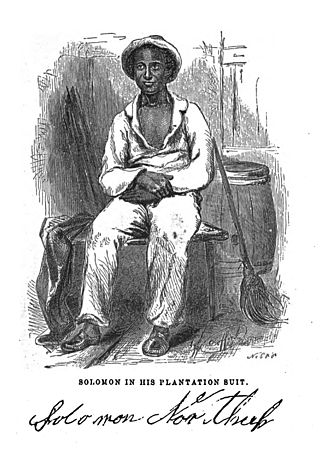
Twelve Years a Slave is an 1853 memoir and slave narrative by Solomon Northup as told to and written by David Wilson. Northup, a black man who was born free in New York state, details himself being tricked to go to Washington, D.C., where he was kidnapped and sold into slavery in the Deep South. He was in bondage for 12 years in Louisiana before he was able to secretly get information to friends and family in New York, who in turn secured his release with the aid of the state. Northup's account provides extensive details on the slave markets in Washington, D.C., and New Orleans, and describes at length cotton and sugar cultivation and slave treatment on major plantations in Louisiana.
Living in a wide range of circumstances and possessing the intersecting identity of both black and female, enslaved women of African descent had nuanced experiences of slavery. Historian Deborah Gray White explains that "the uniqueness of the African-American female's situation is that she stands at the crossroads of two of the most well-developed ideologies in America, that regarding women and that regarding the Negro." Beginning as early on in enslavement as the voyage on the Middle Passage, enslaved women received different treatment due to their gender. In regard to physical labor and hardship, enslaved women received similar treatment to their male counterparts, but they also frequently experienced sexual abuse at the hand of their enslavers who used stereotypes of black women's hypersexuality as justification.

"My Mammy" is an American popular song with music by Walter Donaldson and lyrics by Joe Young and Sam M. Lewis.

The Glorious Adventure is a lost 1918 American silent drama film directed by Hobart Henley.

Freedom suits were lawsuits in the Thirteen Colonies and the United States filed by slaves against slaveholders to assert claims to freedom, often based on descent from a free maternal ancestor, or time held as a resident in a free state or territory.
The strong black woman schema, as defined by scholars, is an archetype of how the ideal Black woman should act. This has been characterized by three components: emotional restraint, independence, and caretaking. Strong black women must hold back their emotions to avoid appearing weak, portray themselves as strong and independent while being responsible for the problems of others, and take care of those problems as if they were their own. Stemming from stereotypes of enslaved Black women, the schema grew from the intersectional oppression Black women face from society's expectations. The notion that as women, they must uphold feminine standards, but as Black women, they must balance that with the responsibility of being emotionally and physically strong; this is also known as intersectionality.

The House On Octavia Street is a 1984 gothic occult historical fiction novel written by Jacqueline La Tourrette. Allegedly based on true events, the book follows the story of Teresa Percy, a poor farm girl who flees domestic violence and becomes the elegant but sheltered protégé of a powerful woman who uses black magic and voodoo to seduce wealthy men.